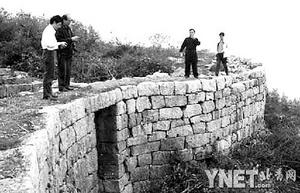On October 13, an archeological team from the provincial administration of cultural heritage arrived at the newly discovered castle site and carried out careful surveying work, according to a Xiao Xiang Morning News report on October 16.
The castle ruin has been maintained in perfect condition. Together with five other “satellite castles” located in its close vicinity, it forms an imposing castle group.
Situated 20 kilometers southeast to Xintian County seat, the castle sits at 685 meters above sea level, the highest in the mountainous area.
The main castle has 17 chambers, with floor space measuring a total of 7,000 square kilometers. The rounded inner walling is 346 meters long and 4 meters high (previously 5-6 meters), and there are gates on its east, west and north sides.
There are two cisterns used to store water fetched from down the mountain. The overall castle was built by fine green slate slabs, each weighing at least one hundred kilograms, requiring complex masonry work. The slates were bound together by a kind of compound adhesive (a mixture of lime, glutinous rice, and tung oil).
“This compound adhesive was usually used in building during the Ming Dynasty (1368-1644),” He Qiang, vice director of the administration, told the newspaper.
After further survey, the experts found another castle group adjacent to the previous one. Such a groundbreaking find naturally attracted more archeologists.
Xintian County is remote and sparsely populated, so archaeologists wonder why the owner spent so much money and manpower to build castles deep in the wilderness of the mountains. Some experts believe that they were built by someone who had a special status and kept a low profile.
Others theorize it served as a sanctuary for the Emperor Zhu Yunwen (the second emperor in the Ming Dynasty) after he stepped down in the wake of a coup. The historical materials revealed that Zhu Yunwen became a fugitive after he was ousted from his regal status.
Xie Wujing, an archeological expert, explained that such complicated architecture could not be completed by an ordinary citizen or mountain bandits. However, if it was constructed by a high official, why did he seclude it from the outside by building it high in the mountains?
“We cannot find any records on the castles in the local annals which even put down the account of a small mountain stronghold,” Xie said.
He Qiang said that some evidence divulged the castles were probably built for fortification. “They were built in the highland and commanded broad views. There are ruins of gun muzzles and large cisterns,” he explained. “The discovery will provide a better perspective on southern Hunan Province’s military history in the Ming and Qing dynasties.”
(China.org.cn by He Shan, October 18, 2007)


